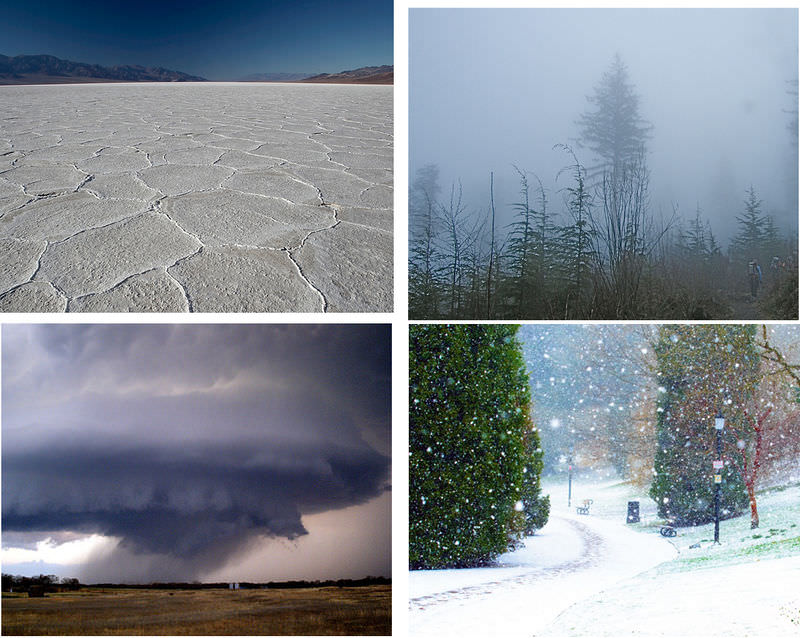11.1天气简介
章节大纲
-
What's the weather like?
::天气怎么样?Depending on where you live, you probably experience many different types of . Weather can be hot or cold; wet or dry; stormy or clear; and everything in between.
::视你住在哪里而定,你可能经历许多不同类型的天气。天气是热的或冷的、湿的或干的、暴风雨或晴朗的,以及两者之间的一切。What Is Weather?
::气象是什么?All weather takes place in the atmosphere . Nearly all of it in the lower atmosphere. Weather refers to the conditions of the atmosphere at a given time and place. Climate is the average of weather over a long time.
::所有天气都发生在大气中,几乎所有天气都发生在低层大气中。天气是指特定时间和地点的大气状况。气候是长期天气的平均数。Imagine your grandmother who lives in a distant place calls you up. She asks what your weather is like today. What would you say? Is it warm or cold? Sunny or cloudy? Calm or windy? Clear or rainy? What features of weather are important to mention?
::想象一下,住在远处的祖母打电话给你,她问你今天的天气是怎样的。你说:是温暖还是寒冷?是阴冷还是阴暗?平静还是风?清风还是下雨?天气的特征重要吗?A location’s weather depends on:
::地点的天气取决于:- air .
::空气 空气 空气 空气 空气 空气 空气 空气 空气 空气 空气 空气 空气 空气 空气 空气 空气 空气 空气 空气 空气 空气 空气 空气 空气 空气 空气 空气 空气 空气 空气 空气 空气 空气 空气 空气 空气 空气 空气 空气 空气 空气 空气 空气 空气 空气 空气 空气 空气 空气 空气 空气 空气 空气 空气 空气 空气 空气 空气 空气 空气 空气 空气 空气 空气 空气 空气 空气 空气 空气 空气 空气 空气 空气 空气 空气 空气 空气 空气 空气 空气 空气 空气 空气 空气 空气 空气 空气 空气 空气 空气 空气 空气 空气 空气 空气 空气 空气 空气 空气 空气 空气 空气 空气 空气 空气 空气 空气 空气 空气 空气 空气 空气 空气 空气 空气 空气 空气 空气 空气 空气 空气 空气 空气 空气 空气 空气 空气 空气 空气 空气 空气 空气 空气 空气 空气 空气 空气 空气 空气 空气 空气 空气 空气 空气 空气 空气 空气 空气 空气 空气 空气 空气 空气 空气 空气 空气 空气 空气 空气 空气 空气 空气 空气 空气 空气 空气 空气 空气 空气 空气 空气 空气 空气 空气 空气 空气 空气 空气 空气 空气 空气 空气 空气 空气 空气 空气 空气 空气 空气 空气 空气 空气 空气 空气 空气 空气 空气 空气 空气 空气 空气 空气 空气 空气 空气 空气 空气 空气 空气 空气 空气 空气 空气 空气 空气 空气 空气 空气 空气 空气 空气 空气 空气 空气 空气 空气 空气 空气 空气 空气 空气 空气 空气 空气 空气 空气 空气 空气 空气 空气 空气 空气 空气 空气 空气 空气 空气 空气 空气 空气 空气 空气 空气 空气
- air pressure .
::空气压力。 - .
- .
- cover.
::覆盖。 - .
- wind speed and direction.
::风速和方向
All of these characteristics are directly related to the amount of energy that is in the system, and where that energy is. The ultimate source of this energy is the .
::所有这些特征都直接关系到系统中的能源数量,以及能源的所在。这种能源的最终来源就是能源。Weather is what we experience from day to day, or minute to minute. Weather can change rapidly.
::天气是我们每天或每分钟经历的。天气可以迅速变化。What Causes Weather?
::什么原因导致天气?Weather occurs because of unequal heating of the atmosphere. The source of heat is the Sun. The general principles behind weather can be stated simply:
::天气发生的原因是大气层的热量不平等。热源是太阳。天气的一般原则可以简单地说:- The Sun heats Earth’s surface more in some places than in others.
::太阳使地球表面在有些地方比在另一些地方更热。
- Where it is warm, heat from the Sun warms the air close to the surface. If there is water at the surface, it may cause some of the water to evaporate.
::在温暖的地方,太阳的热能使靠近表面的空气温暖,如果表面有水,可能会使一些水蒸发。
- Warm air is less dense, so it rises. When this happens, more dense air flows in to take its place. The flowing surface air is wind.
::温暖的空气较不稠密,因此它会上升。一旦发生这种情况,更稠密的空气流将取代它。流出的地表空气是风。
- The rising air cools as it goes higher in the atmosphere. If it is moist, the water vapor may condense. Clouds may form, and precipitation may fall.
::不断上升的空气随着大气的升高而冷却。 如果潮湿,水蒸气可能会凝结。 云会形成,降水也会下降。
Science Friday: Snowflake Safari
::科学星期五:雪花SafariNext snowstorm, grab a magnifying glass and look carefully at snowflakes. Bullet rosettes, stellar plates and capped columns are just a few of the many varieties of snow crystals. In this video by Science Friday, physicist Kenneth Libbrecht shares secrets about snowflakes.
::下一场雪暴,拿起放大镜,仔细看雪花。 子弹玫瑰、恒星板和圆柱只是许多雪晶种类中的少数。 在科学周五的这段影片中,物理学家肯尼斯·利布雷赫特分享了雪花的秘密。Summary
::摘要- A region's weather depends on its air temperature, air pressure, humidity, precipitation, wind speed and direction, and other factors.
::一个区域的天气取决于其气温、空气压力、湿度、降水量、风速和风向以及其他因素。
- Climate is the long-term average of weather.
::气候是长期平均天气。
- Weather can change in minutes, but climate changes very slowly.
::天气可以改变几分钟,但气候变化非常缓慢。
Review
::回顾- Compare and contrast weather and climate.
::比较和对比天气和气候。
- What factors account for a location's weather?
::某个地点的天气是由什么因素造成的?
- Describe how unequal heating causes weather.
::说明取暖不平等如何导致天气。
- air .
